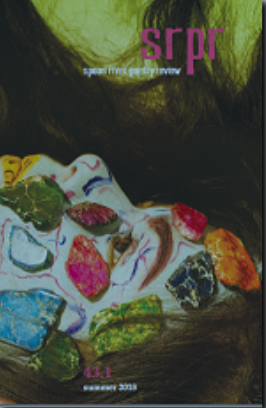Bedecked in grey and coming down from too much llello—we drink Cuban coffee in Ybor inside a cafe that’s too muchcucumber and yellow. It’s morning. I have to be at church.Too much sucrose, caffeine, something, that time he blewme in Trip Park at some corner of my cognizance. I’m badat one-offs. Endless antique yearning in this ole blood balladwarbling through me. Constant sweat rests in my stigmata—yes!—it must be a miracle, the magic of lacerations appearing,and as we drive to the gaudy cathedral I think: there’s a littlebit of Jesus in my hands; cheesy, I know, the way everythingI hold becomes a cross. For years I said every boy I broughthome went to my youth group, played sports beside me,although neither were true. It’s easy to live as a teen athleteuntil you aren’t. When did I depart this life so small?I swallow the urge to talk, to pour treacle into the void.Funerals and weddings are the two that bring me home;I wear the same color to both. Cliché, I know, the way nothingnew can be said of death. Confession: I thought viewingswere always in funeral homes. I thought the hardness of the pew:avoidable. The skin, soft. I think: I could eat the darkhair from his head. I could kiss his reconstructed lips. I could crawl into the casket and hold him, and no human,nailed to a cross or otherwise, could come down and stop me.Could this world support our weight?… …thinking of all the witchery of resurrection……the things I could do to get his tongue back in my mouth…I allow myself just one fantasy, one alternate realitywhere I bring him back to me No one comes back. Someone cries.Someone makes a joke. We leave to brunch on cold cutsand the inside of my guts change. Leave the past in its grottoa narrative voice inside me, who is probably also me, says.This bottle of Perrier meets my lips like a glass boyfriend.Bubbles and the hole inside the hand that continues to weep.Should I apologize for my face? It’s like I’m on a Disney ridecalled YOU ARE INSIDE SOMEONE CRYING, and I won’t get off.If a body touches me now I will cast that body into wilderness.I will let the pomegranate rot, let the salt pillar rise like gingivitis.I will not turn around to see what ghost lingers behind me.To recall you first have to enter the underworld, and as I weepin public my gaze only meets the still tableau of no cars,no bodies walking down the street outside. On this peninsula,there are no basements, no way to come back from the soil.
He Leaves Mt. Olympus to Go Home for a Funeral
Feature Date
- April 13, 2019
Series
Selected By
Share This Poem
Print This Poem
Copyright © 2018 by JD Scott.
All rights reserved.
Reproduced by Poetry Daily with permission.
JD Scott is a writer, editor, and educator. Recent and forthcoming publications include Best American Experimental Writing, Best New Poets, Prairie Schooner, Denver Quarterly, Salt Hill, Sonora Review, the Pinch, Ninth Letter, Tampa Review, and elsewhere. More of JD can be found at jdscott.com.

Summer 2018
Editor
Kirstin Hotelling Zona
Poetry Editor
Steve Halle
Assistant Poetry Editor
Sarah Lyons
Contrary to popular belief, SRPR is not associated with Edgar Lee Masters’ Spoon River Anthology, but was titled after the river in central Illinois that was itself purportedly named for the freshwater mussel shells used by the region’s Native Americans and early colonists as eating utensils—as spoons. Today, SRPR revises its long-standing fascination with regionalism by celebrating a poetics of emplacement: writing that reveals the borders of our comfort zones as sites of connection rather than irreconcilable difference.
In this spirit, each issue of SRPR features a chapbook-length collection of poems by a featured poet with an Illinois connection, as well as a robust variety of outstanding poems from across the nation and world that experiment with and sometimes cut the moorings by which we feel tethered to the known. Additional features in every issue of SRPR include “The SRPRInterview,” an in-depth conversation with our featured poet, as well as “The SRPR Review Essay,” a long analytical article by an established poet-critic on new books of contemporary poems. Poets recently published or forthcoming in SRPR include Jeanne Marie Beaumont, Ewa Chrusciel, Joshua Corey, Joanne Diaz, Arielle Greenberg, Michael Joyce, Edward Hirsch, Joanne Kyger, James Longenbach, Shane McCrae, Jamaal May, Hoa Nguyen, Dzvinia Orlowsky, Danielle Pafunda, Kristin Prevallet, Kit Robinson, Andrew Schelling, Jean Valentine, and Rachel Zucker, among many others.
Founded in 1976, making it one of the nation’s oldest continuously published literary journals, SRPR takes seriously the literary magazine’s historical role as a site for community building—not the creation of a clique or a club, but of a capacious, diverse, and committed community wherein readers and contributors feel at once safe and surprised.
Poetry Daily Depends on You
With your support, we make reading the best contemporary poetry a treasured daily experience. Consider a contribution today.



